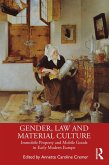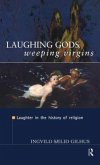Laughing Histories breaks new ground by exploring moments of laughter in early modern Europe, showing how laughter was inflected by gender and social power.
"I dearly love a laugh," declared Jane Austen's heroine Elizabeth Bennet, and her wit won the heart of the aristocratic Mr. Darcy. Yet the widely read Earl of Chesterfield asserted that only "the mob" would laugh out loud; the gentleman should merely smile. This literary contrast raises important historical questions: how did social rules constrain laughter? Did the highest elites really laugh less than others? How did laughter play out in relations between the sexes? Through fascinating case studies of individuals such as the Renaissance artist Benvenuto Cellini, the French aristocrat Madame de Sévigné, and the rising civil servant and diarist Samuel Pepys, Laughing Histories reveals the multiple meanings of laughter, from the court to the tavern and street, in a complex history that paved the way for modern laughter.
With its study of laughter in relation to power, aggression, gender, sex, class, and social bonding, Laughing Histories is perfect for readers interested in the history of emotions, cultural history, gender history, and literature.
"I dearly love a laugh," declared Jane Austen's heroine Elizabeth Bennet, and her wit won the heart of the aristocratic Mr. Darcy. Yet the widely read Earl of Chesterfield asserted that only "the mob" would laugh out loud; the gentleman should merely smile. This literary contrast raises important historical questions: how did social rules constrain laughter? Did the highest elites really laugh less than others? How did laughter play out in relations between the sexes? Through fascinating case studies of individuals such as the Renaissance artist Benvenuto Cellini, the French aristocrat Madame de Sévigné, and the rising civil servant and diarist Samuel Pepys, Laughing Histories reveals the multiple meanings of laughter, from the court to the tavern and street, in a complex history that paved the way for modern laughter.
With its study of laughter in relation to power, aggression, gender, sex, class, and social bonding, Laughing Histories is perfect for readers interested in the history of emotions, cultural history, gender history, and literature.
'This wonderful book is packed with characters who come to life - Cellini, with his demeaning, nasty laughter; the delightful Felix Platter who shaved off his beard to stop being a 'milk mouth' and made himself unrecognizable to his friends; the terrifying Hester Thrale who scored her friends for humour, good humour and wit. Wiltenburg shows how much we reveal of ourselves and of our times through what makes us laugh, and how we laugh. A mind-opening book.'
Lyndal Roper, University of Oxford, UK
'Joy Wiltenburg's stylish new book on laughter is no joke, but rather an elegant, well-informed, clever, and, above all, contextualized study of a subject too readily dismissed as not historical at all or unserious. Wiltenburg's probing analysis of laughter in all its guises-the smirk, the snicker, the smile, the grin, the full-throated roar, the guffaw, and the belly-laugh-addresses the very serious matters of gender, power, and class as they shaped how, when, why, and with whom one laughed. Serious and entertaining by turns, it is also, as fully befits the subject, a rollicking good read.'
Mary Lindemann, University of Miami, USA
'Joy Wiltenburg has given us an astonishingly original insight into one of humanity's truly universal activities. Guided by her sparkling and evocative prose, we come to appreciate laughter as a deeply social language that can reveal or conceal, celebrate or ridicule, bond or antagonize. Moreover, her appropriately entertaining anecdotes from the self-testimonies of expertly selected early modern men and women open a fascinating window into their lost world. Highly recommended for general readers and scholars alike.'
Joel Harrington, Vanderbilt University, USA
Lyndal Roper, University of Oxford, UK
'Joy Wiltenburg's stylish new book on laughter is no joke, but rather an elegant, well-informed, clever, and, above all, contextualized study of a subject too readily dismissed as not historical at all or unserious. Wiltenburg's probing analysis of laughter in all its guises-the smirk, the snicker, the smile, the grin, the full-throated roar, the guffaw, and the belly-laugh-addresses the very serious matters of gender, power, and class as they shaped how, when, why, and with whom one laughed. Serious and entertaining by turns, it is also, as fully befits the subject, a rollicking good read.'
Mary Lindemann, University of Miami, USA
'Joy Wiltenburg has given us an astonishingly original insight into one of humanity's truly universal activities. Guided by her sparkling and evocative prose, we come to appreciate laughter as a deeply social language that can reveal or conceal, celebrate or ridicule, bond or antagonize. Moreover, her appropriately entertaining anecdotes from the self-testimonies of expertly selected early modern men and women open a fascinating window into their lost world. Highly recommended for general readers and scholars alike.'
Joel Harrington, Vanderbilt University, USA








